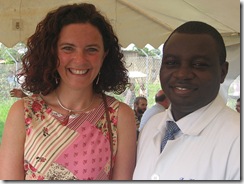
I’ve Looked at Clouds that Way


A good enemy exploits the weaknesses of his prey. The weaknesses that Mike Breen has identified in the American church are: CELEBRITY, CONSUMERISM and COMPETITION. One sure way to be voted off the island on Survivor—to lose your place on the team—is to turn on someone with whom you have an alliance. Consider how the enemy of competition has made the church turn on our own teammates—and in the process miss the REAL enemy.
COMPETITION
You will never find a more hyper-competitive culture than you do in the United States. As a foreigner living in this land, I can attest to that with the utmost respect. Americans love to win, they love the struggle of the journey and love holding up the gold medal of victory. Now don’t hear me wrong, there’s nothing wrong with being competitive, it’s just how competition has become warped and twisted within our culture. And it’s that, at least in the church, we are competitive about the wrong things.
Much of the American church finds itself competing with the church down the road. “Are we bigger than them? Do we have more influence than them? Do we have the best/biggest youth group in town? Do people like to get married in our church building?
Do people like our church better than theirs?â€
The fact of the matter is that there is a battle, we do have an enemy and we should be competitive…but against our enemy! What we haven’t seen is how crafty he is. This seems to be the alliance he has struck with the American church: “I’ll let a good chunk of your churches grow…just not at the expense of my territory.“
And so what happens?
96% of church growth is due to transfer growth and not churches striking into the heart of our enemy’s territory.
We’ll consider it a win because we have the new service or program that is growing…but that growth is mainly from people coming from other churches. That’s not a win! That’s a staggering loss.
Furthermore, for many pastors, we don’t think we’ve won until we’ve won AND someone else has lost. Seriously?! For sure, we have an enemy and we should be competitive, but we should be competing against our enemy, knowing that the final battle has already been won, and not competing against our own team members.
So gifted and skilled is our enemy, so conniving is he, that he has convinced us that beating the people on our own team is victory while he stands back and laughs, rarely having to ever engage in conflict, protecting his territory. He is beating us with a slight of hand, with a clever distraction, turning us against ourselves.
Question: In what ways are you competing (both in actuality or simply in your mind) against people who are on your own team?
In all honesty, it isn’t that the American church will ever truly die or
cease to exist. It will always be there. But it is entirely possible that if these three critical issues aren’t addressed and dealt with, it will be a hallow shell that is spiritually listless.
If we think through Celebrity, Consumerism and Competition, the anti-body against all of these is sacrifice.
Learning to lay down what builds us up and giving to others instead. “Learning to serve, rather than to be served.†Looking for anonymity rather than celebrity. To build a culture of producers rather than a consumers. To live in a vibrant, sacrificial community fighting a real enemy rather than competing against the same community God has given us to fight WITH rather than AGAINST. It’s about sacrificing what we want for the glory of God and the advancement of his Kingdom, regardless of our advancement or desires.
Clearly this is what Paul was getting after in Philippians 2:6-11 when describing the attitude of Jesus as taking on the attitude of a servant, willing to sacrifice all acclaim and equality with God. It was a willingness to set aside and sacrifice celebrity, consumerism and competition at the altar of the incarnation.
Fifty years ago, as these three subtle threads were being woven into the American church, Dr. Martin Luther King, Jr., serving as a prophetic voice, said this:
If today’s church does not recapture the sacrificial spirit of the early church, it will lose its authenticity, forfeit the loyalty of millions, and be dismissed as an irrelevant social club with no meaning for the twentieth century.
We are now into the second decade of the 21st century and we find ourselves still, for the most part, refusing to sacrifice what we want for what God is asking of us and his Church. Will we have the courage to sacrifice as Christ sacrificed? Will we do the things that cost us so that his Kingdom may advance?
Mike Breen, “Obituary for the American Church,†Verge Network
 Recently, I studied the Book of Hebrews with a group of women in my church. Sometimes, when you lead a study you forget to reflect and think personally about how God’s Word is changing you.
Recently, I studied the Book of Hebrews with a group of women in my church. Sometimes, when you lead a study you forget to reflect and think personally about how God’s Word is changing you.
This morning as I reflected on the 13 chapters of Hebrews, I realized God has taught me to look at my circumstances, my culture, and my future through Christ colored lens.
Here are some of the glorious truths that are newly precious to my heart:
 Jesus provides the solution for my sin problem (1:3)
Jesus provides the solution for my sin problem (1:3)
Jesus’ death defeated the devil and freed me from the fear of death! (2:14-15)
Jesus’ incarnation made it possible for Him to become a merciful and faithful High Priest who can help when I am tempted and in need. (2:17; 4:14-16)
 Jesus’ indwelling Spirit gives me "eyes" to see and believe the reality and activity of the invisible God (11:1-3)
Jesus’ indwelling Spirit gives me "eyes" to see and believe the reality and activity of the invisible God (11:1-3) Hallelujah! It is all about you Jesus!
I continue to be drawn to the blog site paradoxuganda written by Doctors Scott and Jennifer Myhre. Here are two entries that compel me to see the news of an epidemic as more than cold abstract statistics. When I read her words, this story of ebola is no longer vague and distant–I am drawn in to pray and be involved in heart and mind–the words become flesh. I am struck again by the power of the word–they communicate more than information– behind and underneath what is written you can sense love and compassion–pain and sorrow–weeping and persevering. It is a Christmas story.
  “Scott was speaking today to one of the World Health Organization visitors who related information from the MSF doctors who cared for Jonah at the end. It was spine-tingling to hear Jonah speak from beyond the veil….
“Scott was speaking today to one of the World Health Organization visitors who related information from the MSF doctors who cared for Jonah at the end. It was spine-tingling to hear Jonah speak from beyond the veil….
Tuesday afternoon, he was still walking and talking, and said to them “I have seen these patients die, and I know that I am dyingâ€. I don’t think they believed him, and I wonder now if that is why he was determined to call us though his efforts were not successful. Moments before he died he said “I am going to die now. And I pray that no one should ever have to die of this disease again.â€
 Right to his last moment he was thinking like the compassionate doctor he was, looking beyond himself to others.
Right to his last moment he was thinking like the compassionate doctor he was, looking beyond himself to others.
Tomorrow his body will arrive, having been carefully decontaminated (as far as possible) and enclosed. His family was still en route when I last talked to them a couple of hours ago. Whenever we speak of him again to someone who cared about him, the tears come freely. We have seen some men here cry like we never saw men cry before.  I think Jonah was perceived as a resource, a gift, to the whole district, everyone feels bereaved and robbed of their man, their doctor, the one they could trust and count on. When we see his family, we will have the complication that they are now contacts too like we are, and we should not be touching each other. So we have to go to the burial of our dear friend without any hugging, comfort his wife and children without touch. That feels harsh.
I think Jonah was perceived as a resource, a gift, to the whole district, everyone feels bereaved and robbed of their man, their doctor, the one they could trust and count on. When we see his family, we will have the complication that they are now contacts too like we are, and we should not be touching each other. So we have to go to the burial of our dear friend without any hugging, comfort his wife and children without touch. That feels harsh.
My mind keeps reaching back to some words of the Psalms which I can’t place, though a thousand have fallen at my side, yet I will trust.

We feel the falling of Jonah so acutely, we were both on the same front line of the same battle fighting side by side, yet he went down and we have not.
I know I can’t trust in anything other than God . . . Certainly not in not dying, which is not guaranteed, as Jonah shows. If we make it through this then what about the next tragedy?
Safety is not the basis of trust. Instead our trust needs to be in God, inexplicable God, dangerous God, other-than-us God, who does not order this world according to our will, but knows more than we do and loves more deeply.”
Posted by DrsMyhre at 11:08 AM
Â
“This afternoon seven of the eight boys who are my kids’ close friends hung out playing cards. I tried to explain ebola, most of these boys are CSB students  whom we sponsor. They asked good questions, but one got me thinking: Is this disease only in Africa, or is it in other parts of the world? I felt disloyal, or sad, to admit that all the major outbreaks had occurred relatively close (on a global scale) to where we now sit, in eastern Congo, southern Sudan, northern Uganda. Almost the only time the filovirus has been found elsewhere was when it was inadvertently transported out in monkeys from Uganda. I could see the world-wide image of Africa, the continent of disease, being reinforced once again. And it is not just a matter of how uninformed or prejudiced westerners view Africa, the assumptions are so powerful they trickle down into the minds of these boys. It seems unfair that Bundibugyo only gets the five minutes of world attention because of yet another disease.”
whom we sponsor. They asked good questions, but one got me thinking: Is this disease only in Africa, or is it in other parts of the world? I felt disloyal, or sad, to admit that all the major outbreaks had occurred relatively close (on a global scale) to where we now sit, in eastern Congo, southern Sudan, northern Uganda. Almost the only time the filovirus has been found elsewhere was when it was inadvertently transported out in monkeys from Uganda. I could see the world-wide image of Africa, the continent of disease, being reinforced once again. And it is not just a matter of how uninformed or prejudiced westerners view Africa, the assumptions are so powerful they trickle down into the minds of these boys. It seems unfair that Bundibugyo only gets the five minutes of world attention because of yet another disease.”
Posted by DrsMyhre at 7:54 AM
J.I. Packer has lamented: “At no time, perhaps, since the Reformation have Christians as a body been so unsure, tentative, and confused as to what they should believe and do.Â
 Certainty about the great issues of Christian faith and conduct is lacking all along the line. The outside observer sees us as staggering on from gimmick to gimmick and stunt to stunt like so many drunks in a fog, not knowing at all where we are or which way we should be going.  Â
Certainty about the great issues of Christian faith and conduct is lacking all along the line. The outside observer sees us as staggering on from gimmick to gimmick and stunt to stunt like so many drunks in a fog, not knowing at all where we are or which way we should be going.  Â
 Preaching is hazy; heads are muddled; hearts fret; doubts strain our strength; uncertainty paralyzes action…We know in our bones that we were made for certainty, and we cannot be happy without it. Yet unlike the first Christians who in three centuries won the Roman world…we lack certainty.”
We want to present the world with an upbeat message. We want to create a positive image. We want to emphasize the many and substantial benefits of the Christian life. We want to put on a happy face. A. W. Tozer decries this accommodated version of the Gospel as a “spiteful cruelty to the lost and languishing–a cruelty misguidedly offered in the name of comfort.” This updated message of indifference does not slay the sinner; it redirects him.”Â
Furthermore: “It gears him into a cleaner and jollier way of living and saves his self-respect. To the self-assertive it says, “Come and assert yourself for Christ.” To the egoist if says, “Come and do your boasting in the Lord.” To the thrill-seeker it says, “Come and enjoy the thrill of the Christian life. The idea behind this kind of thing may be sincere, but its sincerity does not save it from being false.” ((George Grant, “By a Slender Thread,” Tabletalk, May 2002, 16.))Â
Righteousness from God
comes through faith in Jesus Christ
to all who believe (trust) in Christ.
(Romans 3:22)
That might sound like an odd question. I admit that before today, I rarely have thought of my suffering as anyone else’s but mine.  I pull it around me like a wooly shawl and wallow, wallow, wallow–pretty sure that nobody knows the trouble I’ve seen!  Today, as I pondered afresh the implications of 2 Corinthians 1, I felt as though God had switched on a big “ah-ha” light bulb concerning the topic of who owns my suffering. In verses 3-11 Paul writes:
Blessed be the God and Father of our Lord Jesus Christ, the Father of mercies and God of all comfort,  who comforts us in all our affliction, so that we may be able to comfort those who are in any affliction, with the comfort with which we ourselves are comforted by God.  For as we share abundantly in Christ’s sufferings, so through Christ we share abundantly in comfort too.  If we are afflicted, it is for your comfort and salvation; and if we are comforted, it is for your comfort, which you experience when you patiently endure the same sufferings that we suffer.  Our hope for you is unshaken, for we know that as you share in our sufferings, you will also share in our comfort.
For we do not want you to be ignorant, brothers, of the affliction we experienced in Asia. For we were so utterly burdened beyond our strength that we despaired of life itself.  Indeed, we felt that we had received the sentence of death. But that was to make us rely not on ourselves but on God who raises the dead.  He delivered us from such a deadly peril, and he will deliver us. On him we have set our hope that he will deliver us again. You also must help us by prayer, so that many will give thanks on our behalf for the blessing granted us through the prayers of many. (2 Corinthians 2:3-11)
It is comforting that Paul doesn’t want me to remain ignorant on this topic!  His words teach me that:
The new thought today came from the phrase, “as we share abundantly in Christ’s sufferings”. That verse suggests that suffering as a Christian is not a solitary experience. Our unity with Christ is so total that our suffering is described as being shared and as belonging to Christ.
“Perhaps it is easier to recognize that our blessings belong to the Lord than it is to recognize that he owns our suffering. If you watch someone suffer, you will see that we tend to treat suffering as something that belongs to us, something we can respond to as we please. We tend to turn in on ourselves. Our world shrinks to the size of our pain. We want little more than release, and we tend to be irritable and demanding.
It does not take long to learn that suffering brings you power. As you cry in pain, people run to help you. They offer you physical comfort, say nice things, and release you from our duties…A whole host of self-absorbed temptations greet us when we treat suffering as something that belongs to us. This passage reminds us that our suffering belongs to the Lord. It is an instrument of his purpose in us and for others. The way we suffer must put Christ on center stage. The Redeemer owns our disappointment and fear. He owns our physical and spiritual pain. He owns those crushing past experiences. He owns our rejections and aloneness. He owns our dashed expectations and broken dreams. It all belongs to him for his purpose. When we feel like dying, he calls us to a greater death. He calls us to die to our suffering so that we may live for him.
This is not a call to some creepy form of Christian stoicism. It is a call to bring the full range of our suffering to Him. We are to weep loudly and mourn fully before him, knowing that true comfort can only be found at his feet. We are to place our mourning in his hands to be used for his purposes in our lives and the lives of others. And it is a promise of comfort from the God who is the source of it all.” ((Paul David Tripp, Instruments in the Redeemer’s Hands, p. 153-4))
Today, I am grateful to be in a family where suffering is not wasted but is purposefully directed toward receiving and giving comfort! What a relief to be freed from owning my suffering–what a privilege to know it is shared with the Lord Jesus.
 With a wonderful cup of Ethiopian Sudoma coffee and my Bible,  I began the morning. I have lingered over Psalm 131 for some time now pondering David’s description of having a still and quiet spirit like that of a weaned child.  As I read I thought, “How I long for the still quiet soul that David writes of–my calm comes in fits and starts–I am ruled by the circumstances of my life and feel more like a pinball bouncing in a machine than a weaned child. What do I need to be weaned of that I might enjoy the contented life?” I went searching through the weighty wisdom of past saints to help me think this through!
With a wonderful cup of Ethiopian Sudoma coffee and my Bible,  I began the morning. I have lingered over Psalm 131 for some time now pondering David’s description of having a still and quiet spirit like that of a weaned child.  As I read I thought, “How I long for the still quiet soul that David writes of–my calm comes in fits and starts–I am ruled by the circumstances of my life and feel more like a pinball bouncing in a machine than a weaned child. What do I need to be weaned of that I might enjoy the contented life?” I went searching through the weighty wisdom of past saints to help me think this through!
“The soul is weaned from one thing by giving its attention to another. The task to the mother is trying and troublesome. The infant cries, and seems to sob out his heart. He thinks it very hard in her, and knows not what she means by her seeming cruelty, and the mother’s fondness renders all her firmness necessary to keep her at the process; and sometimes she also
weeps at his pleading looks and big tears and outstretched hands…and she pities and perseveres; the child is denied his comfort and therefore frets and worries and flies into tantrums and sinks into sulks.
Yet time brings not only alleviations, but the ending of the conflict; the child now is quite content to find his nourishment at the table with his brothers, and feels no lingering wish to return to those dear fountains from which he once sustained his life. He is no longer angry with his mother, but buries his head in that very bosom after which he pined so grievously: he is weaned on his mother rather than from her. To the weaned child, his mother is his comfort though she has denied him comfort.Â
It is a blessed mark of growth out of spiritual infancy when we can forego the joys which once appeared essential, and can find our solace in Him who denies them to us. When we think ourselves safely through the weaning, we sadly discover that the old appetites are rather wounded than slain, and we begin crying again for the breasts which we had given up.Â
 Weaning takes the child out of a temporary condition into a state in which he will continue for the rest of his life: to rise above the world to enter upon a heavenly existence which can never end.  When we cease to hanker for what the world has to offer we begin hoping in the Lord. O Lord, as a parent weans a child, so do wean me, and then shall I fix all my hope on you alone.”Â
William Jay (1769-1853), in “Evening Exercises for the Closet.” and Charles Spurgeon, “The Treasury of David“. “Mother and Child” by Joanne Burns
Well, it seems that learning to be content carries with it many lessons of “loss”. When we are weaned as infants, we lose the milk we desire in order to be able to receive the solid food we now need for growth. If I am to be content I must crawl up on the lap of God and be content on Him and not seek it away from Him! My affections need to be weaned from all lesser affections that I seek to substitute for the Greatest One! As my friend Jane reminded me–a weaned child is a contented child!